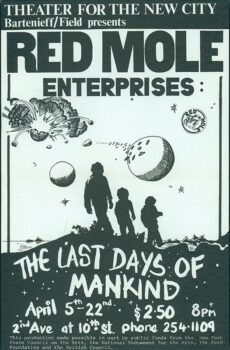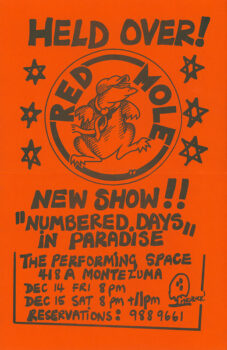Red Mole: A Romance: Dir. Annie Goldson (Film Review)
RED MOLE: A ROMANCE is the only chance you may have in your lifetime to see a small glimpse of what some of us lucky ones still retain fragments of in our memories: of this theatre group performing live.
In their day, live, NZ group Red Mole were theatre dynamite. A movement for radical, provocative theatre that could have, should have, and almost did explode. That it didn’t, and almost killed the troupe trying, is the story of this film.
 It’s also a love story (you see that careful subtitle there?) love of art, of adventure, of theatre, of each other — of pushing yourself to your creative limits just to see what breaks.
It’s also a love story (you see that careful subtitle there?) love of art, of adventure, of theatre, of each other — of pushing yourself to your creative limits just to see what breaks.
They did break. Tragically, as we learn. But not before they almost brought about a revolution.
Some of those with some of those fragments still in their memory turned out at Newmarket last night in a one-off showing of this 2023 film, previously shown at last year’s IFF film festival, and now on limited release around the country. Competing at Newmarket’s Rialto last night with biopics of Priscilla Presley and Bob Marley, it was up against tough competition. But a roomful of grey-haired boomers and two enlightened teenagers drank it down to the dregs.
Proof perhaps that even the blandest suburbs hold folk within them who may be even stranger than you think.
 “Someday all theatre will be like this!” That was the battle cry they hurled at the world. It isn’t, but should be. I was lucky enough to see Red Mole back in the day, at the Mangere Metro, in the street, at the Island of Real. It was revolutionary stuff, magnetic. Still fixed in the memory now.
“Someday all theatre will be like this!” That was the battle cry they hurled at the world. It isn’t, but should be. I was lucky enough to see Red Mole back in the day, at the Mangere Metro, in the street, at the Island of Real. It was revolutionary stuff, magnetic. Still fixed in the memory now.
Said to have been formed by “a chance meeting of a group of New Zealanders, in an opium den behind a Shell service station in Luang Prabang in Laos” (every group needs their foundation myths), the Red Mole company first took over a strip club, then tried to take over the world. Red Mole dreamed big, but grew slowly, blending cabaret, variety, political satire, hardcore absurdist theatre, puppetry, mask-making and circus arts. Dynamic driving force Alan Brunton, poet and writing machine, was continually at work banging out pointed scripts, while a freewheeling set of collaborators embroidered them, making characters, costumes, sets, skits, masks and machines to grace the surrealist stage. New Zealand had never, and still hasn’t, seen anything like it.
At the core of the Red Mole theatre company, like the nucleus of an atom, was the “Gang of Three”: Alan Brunton, the fevered genius; Sally Rodwell, bringing ideas to life; Deborah Hunt, with the energy and the craft of puppetry, costume, maskmaking and fire-eating. Around them rotated the multi-talented band of creatives from musicians Jan Preston, Midge Marsden, Jean McAllister, Tony McMaster, Neil Hannan, to actors John Davies, Martin Edmond, Arthur Baysting, Ian Prior, Rose Wedde, creating theatrical events that are still remembered today.
We see them all, in an out of costume, in performance and on the road, in strip clubs, theatres, community centres, streets and school halls from Invercargill to Manhattan. They made art wherever they could, from whatever there was. They were always tuned in, always turned on, changing scripts constantly to reflect and skewer the stories of the week. For a hint of that dedication, John Davies tells us that n that calling he was nailed up, crucified, and sometimes set on fire. (And all that just in one night!)
 One of the many tragedies is that so little of it was recorded, either on film or on audio tape. (Some of those fragments can still be seen at NZ on Screen, trawled through at the Auckland University archives, and heard at the NZ Electronic Poetry Centre.) But how much has been lost!
One of the many tragedies is that so little of it was recorded, either on film or on audio tape. (Some of those fragments can still be seen at NZ on Screen, trawled through at the Auckland University archives, and heard at the NZ Electronic Poetry Centre.) But how much has been lost!
Film-maker Annie Goldson has done what she can with what there is. Her focus is Sally and Alan’s daughter Ruby, following her journey to re-explore the old haunts she grew up with, and to follow her own memories. She’s the focus, and her own brief readings reveal what she has from each of her parents, but she’s overshadowed by the powerful images and fragments of the performance of this colourful troupe.
Interviews with Deborah Hunt, Martin Edmonds and their former Manhattan manager Nan Goldin give us much of the story. Deborah outlines the group’s manifesto, written behind that Shell station in Laos:
- to keep (the) romance alive.
- to escape programmed behaviour by remaining erratic.
- to preserve the unclear and inexplicit idioms of everyday speech.
- to abhor the domination of any person over any other.
- to expend energy.
And expend energy they did! They were utterly driven, completely entrepreneurial., doing anything and everything to keep the art alive. Need a group to do a satire on Michael Joseph Savage for a parliamentary performance? (We can write you up one so pointed you never dreamed of it, and be there this afternoon to perform it.) Need a theatre carpeted in return for a six-week residency? We can do that (and race to the library first to find out how). Need an impossible moving job done from warehouse to warehouse across Manhattan? We can do that. (“We’ll just take speed for 20 hours and do it.”)
They made it to Manhattan, left for New Mexico, and ended up in Island Bay where the dream finally ended.
We’re left wondering: Why do we not have full-on theatre like this any more? Why are we now so much more prissy and puritanical? We see punk cabaret and burlesque, satire and surrealism, but so rarely together, and not with quite the same spark.
There was something magical there. It’s a tragedy that the troupe, and the film end on tragedy. But unavoidable.
They had chances to “crack the big time” in each time and place — in Wellington, Auckland and then Manhattan — each time they could have continued, repeating themselves. But they couldn’t do that, refused to become parodies of themselves, always had to keep making it new.
In the end the energy deserted them and it all began to fall apart.
There are books of scripts, of Brunton’s poetry, and Martin Edmond’s account in his memoir Bus Stops to the Moon: Red Mole Days 1974-1980. But this film, fragmentary though it is, is probably the fullest visual account we’re going to have.
Treasure it. And see it if you can.
Peter Cresswell
Limited run, in cinemas now, briefly. Info here
Interview with the director here
Red Mole at AudioCulture here
Backgrounder by Red Mole member Martin Edmond here. Interview here.